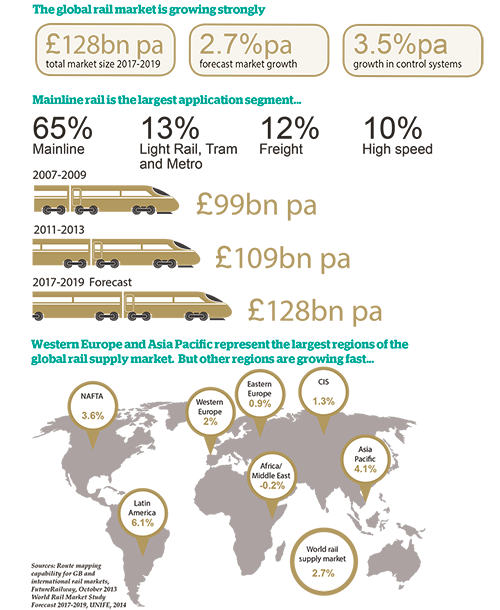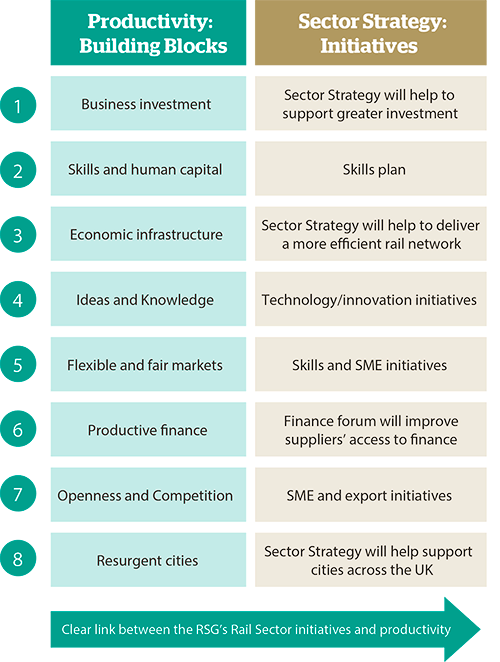The RSG will work with government and the National Skills Academy for Rail to increase promotional activity in schools and colleges, to ensure young people have access to information and to ambassadors for rail careers.
The industry has been set an ambitious target by Terry Morgan, in his Transport Infrastructure Skills Plan, to increase the number of apprentices in rail. By providing a strong single voice for the rail supply chain, the RSG will work to achieve this growth in apprenticeships through the production of a detailed skills plan, including raising the profile of the industry to attract and retain a diverse and high-performing workforce.
However, it is also important to deliver effective training to upskill experienced staff and equip them for today’s rapidly changing railway. Measures such as the RSG’s proposed Assessment and Assurance Panel and its Skills Intelligence Unit will monitor the quality of the sector’s training offering and its skills gap respectively. The RSG will also support the development of a network of training facilities, to increase the availability and visibility of the highest-quality training capacity across the UK.
The RSG recognises the importance of targeted action to increase genuine demand for training. A new procurement approach that requires 5% of a bidder’s staff to be in training at pre-qualification will drive upskilling in the sector, while a new talent pool for recent apprentices will provide a ready supply of high-calibre talent for all businesses in the industry (including growing SMEs) to draw on. By delivering these changes for new and existing workers the rail sector can transform its productivity in support of a globally competitive industry.
Exports
All of these achievements will provide a stable base upon which to increase the exporting capability of the UK’s rail suppliers. By developing the UK’s strong home market and working closely with its world-class universities, the rail sector can strengthen its solid platform for exports to take advantage of the 2.7% annual growth in the global rail market.
Some areas of UK rail need urgent support to make the most of these opportunities. Many SMEs with world-class technology do not have the resources to compete internationally. Some of the measures planned to support UK rail SMEs have been outlined above, such as the finance forum to allow greater access to capital. It is also important that the supply chain continues its history of collaboration, with large players helping to develop the capabilities of new businesses.
It is also clear that international standards should not be developed without the input of UK industry. UK manufacturers will benefit greatly from consistent standards at home and abroad, so that products made for the UK railway can be sold into the largest possible overseas markets.
The experience of European Technical Specifications for Interoperability has shown that standards can make exporting common technologies and skills significantly easier, while ISO and IEC perform effectively at the global level. So RSG will work with the British Standards Institution and Government to further support our UK representatives in their work with standards committees.
We know that we have strong institutions to support UK exports in UK Trade & Investment and our own industry associations. The RSG strategy sets out the group’s plan to continue its close work with government to promote UK rail across the globe. By stimulating and promoting the whole supply chain we can unlock exports and inward investment on an unprecedented scale.
SMEs engaged with UK rail innovation will continue to form a key part of the RSG council and a focus for its work. Two initiatives have already been launched by the RSG and its partners: the Rail Mentoring scheme (run by RSG member association the Rail Alliance), and Open Doors (an RSG scheme run by its SME members).
Rail Mentoring matches rail SMEs with mentors drawn from large businesses across the rail supply chain, for a range of support. Prior to partnering with an organisation, the Rail Alliance works with SMEs to develop the skills of SMEs with experience in the rail industry and of those trying to bring their innovative products to the supply chain for the first time.
Once partnered with one or more large suppliers, SMEs have access to industry-leading expertise to advance their products and access new markets.
Open Doors, meanwhile, was developed to help SMEs fast-track their innovative products directly to Tier 1 suppliers, original equipment manufacturers and train operating companies. By providing a single senior contact within large companies, the scheme ensures rapid evaluation of SME products, with appropriate feedback.
We want this strategy to reflect the reality that our sector faces, and it absolutely must be deliverable. We will keep it under review, and we will report on our progress regularly and transparently. This is our action plan for our sector, to get us into a healthier, sustainable position.
I still have my day job (as we all do), but we all recognise the need to collaborate across our sector and to work in partnership with government. We can carry on talking well and hoping that a slice of the action will come our way. But really we need to have a proper, evidenced plan that is going to make a real difference. This is what we have done with the sector strategy.
As I said at the start, this is a time of huge opportunity for the rail supply sector in the UK. It would be unfortunate if we didn’t get our act together and ensure we are capable of taking full advantage. This is the first big step towards getting our sector on track to deliver that success.
Read the peer reviews for this feature.
Download the graphs for this feature.













